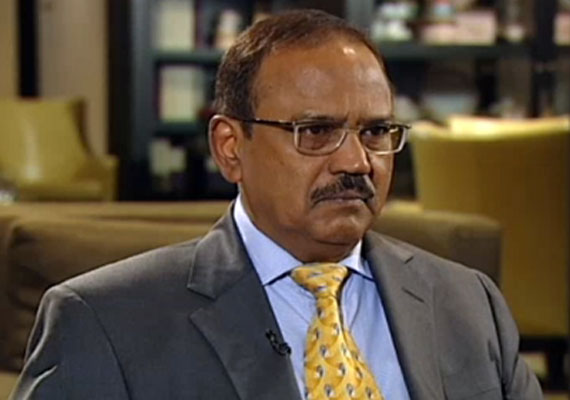NSA Doval's "Coup" Against Rajapaksa And China in Sri Lanka
Ajit Doval

NEW DELHI: National Security Advisor Ajit Doval is clearly the man to watch in the Modi government. An intelligence sleuth known for his penchant and expertise in covert operations Doval has emerged as the ‘foreign policy’ face in the government eclipsing the Ministry of External Affairs and Minister Sushma Swaraj in determining policy.
His is a strong and valuable input in the Prime Ministers Office with PM Narendra Modi having given Doval a virtually free hand. China, that Doval has visited and is directly determining policy on, is clearly not perceived by New Delhi as a friend and is one of the primary reasons for the reaching out to the United States. ‘Engagement’ is also under review, and it is certainly not going to be at the levels achieved by former Prime Ministers Atal Behari Vajpayee and Manmohan Singh under the advice of their respective National Security Advisors Brajesh Mishra and Shiv Shankar Menon.
A clear indication that friendship with China is a major factor in determining India’s relations with a country comes from a Reuters news agency report that has confirmed whispers of a classic Doval covert operation in Sri Lanka where India is alleged to have played a major role in destabilising the Rajapaksa government in favour of the new dispensation.
The report, quoting political and intelligence sources, said that Sri Lanka expelled the Colombo station chief of RAW in the run up to this month's presidential election accusing him of helping the opposition oust the then President Mahinda Rajapaksa who was indeed trounced subsequently in the polls in January this year. The report suggests that Colombo asked New Delhi to withdraw the agent for covert activities in favour of the opposition joined candidate Maithripala Sirisena. A low key figure he surprised all by winning the elections, and according to Reuters he was persuaded to leave the Rajapaksa cabinet at the instance of the Indian external intelligence agency Research and Analysis Wing.
The British news agency has recalled India’s continuous intervention in Sri Lankan affairs, and recent worry that it was losing ground because of former President Rajapaksa’s tilt towards China. The Reuters report noted, “the concern turned to alarm late last year when Rajapaksa allowed two Chinese submarines to dock in Sri Lanka without warning New Delhi as he should have under a standing agreement.”
The submarines docked in early November. Late November Doval was un Colombo to ostensibly meet Rajapaksa, but clearly judging from the information now, to confirm support for Sirisena through meetings with him and his backers former President Chandrika Kumaratunga and former Prime Minister Ranil Wickremensinghe. He also met leaders of the main Tamil party Tamil National Alliance that did not then boycott the polls making these an “inclusive” election.
Interestingly during the same visit Doval delivered the inaugural lecture at the Galle Dialogue where he spoke of maritime threats around the Indian Ocean, and the need for cooperation and collaboration amongst nations for maritime security.
Sirisena, since coming to power, has been making conciliatory pro-India noises. His first foreign trip will be to New Delhi in February and he has made it very clear that India will be his main concern of foreign policy. Reuters reported that the RAW official “had worked with Sri Lanka's usually fractious opposition parties to agree on a joint contender for the election. Then, he was accused of facilitating meetings to encourage several lawmakers, among them Sirisena, to defect from Rajapaksa's party, the official said.
The agent was accused of playing a role in convincing the main leader of the opposition and former prime minister Ranil Wickremasinghe not to contest against Rajapaksa in the election and stand aside for someone who could be sure of winning, said the officer and a Sri Lankan lawmaker who also maintains close contacts with India.
The agent was also in touch with former president Chandrika Kumaratunga, who was a key player in convincing Sirisena to stand, said the officer and the lawmaker, who also confirmed that the agent had been asked to leave.” These were all the leaders Doval met during his visit as well.
It is thus, not a coincidence that Wickremasinghe is now prime minister in the Sirisena government. Ironically the ‘cover’ being given to RAW officers as ‘diplomats’ in the Indian missions abroad is just tokenism now. And as Reuters has noted, “India's RAW officers are usually given diplomatic posts when assigned to foreign missions.”
Rajapaksa declined to comment and merely said when contacted by the Reuters reporters, "I don't know, I won't suspect anybody until I get my real facts."
The covert operations followed assessments that Rajapaksa had moved into China’s camp. The former President visited China seven times since 2005, and relations between Colombo and Beijing were gathering strength, but the final straw for India was the permission for the Chinese submarines to dock on two different occasions without informing India as per the provisions of a bilateral maritime pact. This was perceived by New Delhi as a threat with Doval and his team moving in to stitch together a veritable coup.



